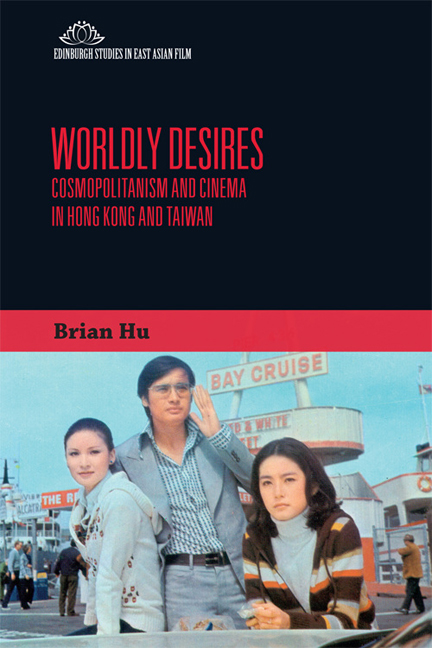Book contents
- Frontmatter
- Contents
- List of Figures and Tables
- Acknowledgments
- Notes on Romanization
- Introduction
- 1 Melodramas of Arrival and Departure: Jet-set Students in 1970s Taiwanese Romance
- 2 ABCs, Mixed-race Stars, and Other Monsters of Globalization
- 3 Setting the Stage: Hong Kong Musical Stars Take on the World
- 4 All the Right Moves: Mobile Heroes and the Shaolin Temple Film
- 5 The Cosmopolitan Brand: Film Policy as Cultural Work in the International Film Market
- Conclusion
- Works Cited
- Index
2 - ABCs, Mixed-race Stars, and Other Monsters of Globalization
Published online by Cambridge University Press: 04 May 2021
- Frontmatter
- Contents
- List of Figures and Tables
- Acknowledgments
- Notes on Romanization
- Introduction
- 1 Melodramas of Arrival and Departure: Jet-set Students in 1970s Taiwanese Romance
- 2 ABCs, Mixed-race Stars, and Other Monsters of Globalization
- 3 Setting the Stage: Hong Kong Musical Stars Take on the World
- 4 All the Right Moves: Mobile Heroes and the Shaolin Temple Film
- 5 The Cosmopolitan Brand: Film Policy as Cultural Work in the International Film Market
- Conclusion
- Works Cited
- Index
Summary
In my conversations with individuals who grew up in Hong Kong and Taiwan during the 1990s and early 2000s, I noticed a startling trend about the perceptions of Chinese Americans—the so-called “ABCs” (“American Born Chinese”). I expected the old complaint about cultural loss or even ethnic disloyalty, the claim that Chinese Americans are too Westernized or not Chinese enough. But that, as I eventually realized, is the perspective of an older generation, the generation of romantic overseas patriots that I discussed in the previous chapter. That was the perspective sensitive to the sojourner's national disloyalty and abandoning of one's home that L. Ling-chi Wang describes in his formulation of the “structure of dual domination.”
However, the younger Taiwanese and Hong Kongers didn't speak of loss, which implies a desire to protect a pure state, but of difference, which implies hybridity or even mutation. “They’re just different,” was a frequent answer to my questions about perceptions of “ABCs.” My interviewees’ inability to articulate that difference is testament to the fact that this difference presented no major moral cause for worry, as had been the case with the foreign students in Taiwan during the brain-drain 1970s. Furthermore, my interviewees could not articulate that difference because those differences were usually on the level of the visual and the aural, not on the level of loyalty with its familiar propaganda slogans and other religious/nationalistic sermonizing. When pressed to describe those perceptual differences in detail, the responses tended to be “they just look different” or “they just sound different,” as if they felt those differences and even thought it unnecessary to articulate those differences because they should be self-evident. Pressed further, respondents may mention acquired environmental differences (American accents, tanner skin, pierced ears, tattoos, more muscular build for men, chubbier face and body for women) and, strangely enough, phenotypic ones as well (higher-bridged noses, narrower and more angular faces, taller frames). That Chinese Americans may not be genetically very different from their cousins in Hong Kong and Taiwan seemed beside the point to my respondents, as was the fact that the respondents were making these points to a Chinese American researcher who may find it strange to be othered in such a way.
- Type
- Chapter
- Information
- Worldly DesiresCosmopolitanism and Cinema in Hong Kong and Taiwan, pp. 63 - 107Publisher: Edinburgh University PressPrint publication year: 2018



